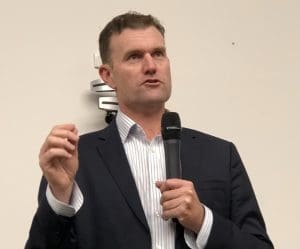MLA’s Commitment to Sustainable Red Meat Production Amidst Policy Changes
Despite recent shifts in policy, Meat & Livestock Australia (MLA) remains dedicated to aiding the red meat sector in its quest for net zero carbon emissions. This commitment comes at a time when the industry has abandoned the target outlined in its Red Meat 2030 plan.
Key Insights from the 2025 ICMJ Conference
At last week’s Intercollegiate Meat Judging Competition’s 2025 conference, held at Charles Sturt University in Wagga Wagga, MLA’s managing director, Michael Crowley, emphasized the organization’s focus on investments to enhance sustainability.

MLA managing director Mike Crowley at the ICMJ conference.
Progressing Towards Net Zero
“We’ve aligned ourselves with the national net zero ambition and those targets at a national level didn’t exist ten years ago,” Crowley stated. He underscored the importance of transitioning from research and development to the adoption and commercialization of innovative practices, including:
- Feed supplements
- Methane as a trait in genetic evaluation for beef and sheep
- Feedbase pasture varieties that enhance productivity and carbon sequestration in soil
Moreover, MLA is investing in technology aimed at reducing the costs associated with measuring soil carbon. “I do believe we can still continue to get to a net zero position,” Crowley affirmed.
The Importance of Innovation
Despite the recent policy adjustments in the Red Meat 2030 plan, Crowley assured that the innovation agenda will persist vigorously. He highlighted the necessity of being “on the front foot” in addressing climate change and acknowledged that global consumers and major stakeholders demand emission reductions across all sectors.
Crowley reflected on his involvement in developing the CN 2030 agenda back in 2017, recognizing it as a pivotal response to a major global trend. “We have to play our role in undeniable climate change,” he remarked, emphasizing the significance of addressing methane emissions despite the industry’s existing efficiency.
Carbon Sequestration Opportunities
With methane’s high warming potential, Crowley reiterated the necessity of proactive measures, stating, “We can not only make progress but be a significant part of the solution.” He acknowledged that while much progress has arisen from advancements in vegetation management and reafforestation, robust data and evidence are crucial for supporting the sector’s net carbon position as part of the national greenhouse gas inventory.
“Our net carbon position is vitally important,” Crowley concluded, highlighting the unique ability of the industry to sequester carbon and improve soil and vegetation health. Furthermore, he expressed optimism that adopting feed supplements and best management practices could lead to additional revenue opportunities through carbon credits over the coming years.
This HTML-formatted article presents an overview of the MLA’s initiatives regarding carbon emissions, ensuring clarity and readability for seamless integration into WordPress.



